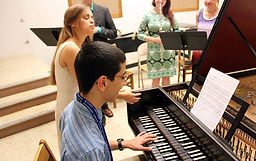

Teaching Philosophy

An ideal musical education nurtures not only the development of informed students, or even great musicians, but of well-rounded fellow artists who are equipped to discover and share with their own unique voices the inexplicably profound power of music to move us, to speak deeply to our humanity, and to transcend it, all while piercing through the limits of centuries, language, and borders.






To that end, helping students develop an intrinsic motivation built upon a love for music and excitement to share it with others is a priority. Lessons aim at preparing classical repertoire for performance by giving students the tools they need to be both knowledgable (regarding the background of their repertoire, technical skills, theory, performance traditions and historical performance practice) and independent (able to practice effectively, develop mature expressivity, individual tastes, and aptitude in convincing and individual score interpretation).
Intermediate students learn theory, technique, and sight-reading using Czerny, Hanon, Fingerpower, other exercise and etudes books, and original resources. The Wiener Urtext Primo edition or Henle's "At the Piano" edition are used for Baroque, Classical, and Romantic era repertoire in addition to the Alfred anthology for 20th century music. Other resources include works from the Notebook for Anna Magdalena Bach, Bach Inventions, and Keith Snell etude or romantic & 20th century collections. Theory is taught with the goals of skilled independent analysis and creative implementation.
Advanced students begin to learn virtuosic etudes and concerti as a part of their regular curriculum. Urtext/critical scholarly editions of Baroque to Romantic works are used (ex. Le Pupitre, Henle, NBA, Chopin National, EMB, Wiener Urtext) with additional reference to performer editions (ex: Paderewski, Schnable). Other staples of repertoire for advanced students typically include preludes and fugues from the WTC, Baroque suites, classical sonatas, and large romantic era works. Students also prepare 20th and 21st century repertoire and repertoire by a diverse array of other non-European or lesser-known composers.
All students are given a well-rounded musical education including the following:
-
Performance opportunities (student recitals twice yearly, at no cost)
-
Varied and diverse classical repertoire (Baroque-21st Century)
-
Practicing principles of virtuosic technique from the start (including technical exercises)
-
Music listening to encourage the development of a robust musical intuition
-
Learning principles of score interpretation
-
Understanding of music theory (keys, intervals, roman numeral analysis, functional harmony, voice leading, form & analysis, composition)
